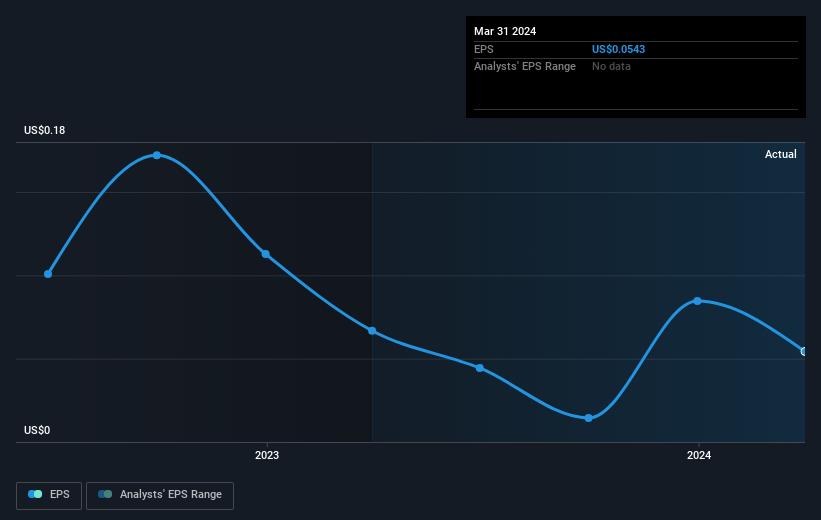- Canada
- /
- Oil and Gas
- /
- TSXV:TPL
Investors one-year losses continue as Tethys Petroleum (CVE:TPL) dips a further 23% this week, earnings continue to decline

It's easy to match the overall market return by buying an index fund. Active investors aim to buy stocks that vastly outperform the market - but in the process, they risk under-performance. Investors in Tethys Petroleum Limited (CVE:TPL) have tasted that bitter downside in the last year, as the share price dropped 26%. That's disappointing when you consider the market returned 15%. At least the damage isn't so bad if you look at the last three years, since the stock is down 17% in that time. In the last ninety days we've seen the share price slide 43%.
With the stock having lost 23% in the past week, it's worth taking a look at business performance and seeing if there's any red flags.
See our latest analysis for Tethys Petroleum
While the efficient markets hypothesis continues to be taught by some, it has been proven that markets are over-reactive dynamic systems, and investors are not always rational. One imperfect but simple way to consider how the market perception of a company has shifted is to compare the change in the earnings per share (EPS) with the share price movement.
Unfortunately Tethys Petroleum reported an EPS drop of 19% for the last year. This reduction in EPS is not as bad as the 26% share price fall. Unsurprisingly, given the lack of EPS growth, the market seems to be more cautious about the stock. The P/E ratio of 7.16 also points to the negative market sentiment.
You can see how EPS has changed over time in the image below (click on the chart to see the exact values).

It might be well worthwhile taking a look at our free report on Tethys Petroleum's earnings, revenue and cash flow.
A Different Perspective
While the broader market gained around 15% in the last year, Tethys Petroleum shareholders lost 26%. Even the share prices of good stocks drop sometimes, but we want to see improvements in the fundamental metrics of a business, before getting too interested. On the bright side, long term shareholders have made money, with a gain of 2% per year over half a decade. It could be that the recent sell-off is an opportunity, so it may be worth checking the fundamental data for signs of a long term growth trend. It's always interesting to track share price performance over the longer term. But to understand Tethys Petroleum better, we need to consider many other factors. Case in point: We've spotted 2 warning signs for Tethys Petroleum you should be aware of, and 1 of them makes us a bit uncomfortable.
But note: Tethys Petroleum may not be the best stock to buy. So take a peek at this free list of interesting companies with past earnings growth (and further growth forecast).
Please note, the market returns quoted in this article reflect the market weighted average returns of stocks that currently trade on Canadian exchanges.
Valuation is complex, but we're here to simplify it.
Discover if Tethys Petroleum might be undervalued or overvalued with our detailed analysis, featuring fair value estimates, potential risks, dividends, insider trades, and its financial condition.
Access Free AnalysisHave feedback on this article? Concerned about the content? Get in touch with us directly. Alternatively, email editorial-team (at) simplywallst.com.
This article by Simply Wall St is general in nature. We provide commentary based on historical data and analyst forecasts only using an unbiased methodology and our articles are not intended to be financial advice. It does not constitute a recommendation to buy or sell any stock, and does not take account of your objectives, or your financial situation. We aim to bring you long-term focused analysis driven by fundamental data. Note that our analysis may not factor in the latest price-sensitive company announcements or qualitative material. Simply Wall St has no position in any stocks mentioned.
Have feedback on this article? Concerned about the content? Get in touch with us directly. Alternatively, email editorial-team@simplywallst.com
About TSXV:TPL
Tethys Petroleum
Acquires, explores for, and develops crude oil and natural gas fields in Kazakhstan.
Mediocre balance sheet minimal.
Market Insights
Community Narratives



